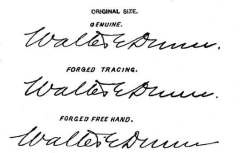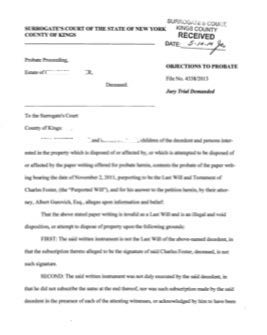Codicil Contests in New York City
To contest a codicil, it’s not enough to disagree with it. One would have to establish one of the following grounds:
- Technical Failure. There were technical errors in how the codicil was made.
- Pressure and Manipulation. Someone pressured and manipulated the person into making the codicil.
- Diminished Mental Capacity. The person suffered from cognitive decline that interfered with his ability to understand the codicil.
- Forgery. The codicil is a fake.
- Fraud. The person made the codicil because someone has been lying to him.
We will explain the basics of each codicil contest ground, the process of contesting a codicil, and the process of defending a codicil.
Technical Failure

If there are technical errors in how a codicil was made, it may be possible to contest and invalidate it. Having a lawyer argue against a problematic codicil on narrow procedural grounds can potentially get it thrown out.
The most common technical errors in codicils are:
- One or both of the witnesses did not see the person sign.
- The person did not declare to the witnesses that it’s his codicil.
When talking about technical grounds, we mostly deal with homemade DIY codicils, made without an attorney. That’s where people make technical mistakes. If a lawyer was present, we assume that the codicil was made correctly.
Pressure and Manipulation

It is possible to invalidate a codicil if someone manipulated or pressured the person making the codicil. However, “undue influence” can be hard to prove. You would need evidence showing a trusted person in the codicil-maker’s life took unfair advantage of them.
Typically, this would be someone the codicil-maker depended on like a caregiver, family member, or advisor. And that person would have pushed for terms of the codicil that greatly favored them.
Suspicious circumstances can point to undue influence. For example, the beneficiary was involved in making the codicil. Or the witnesses are the beneficiary’s friends. Or changes that contradict long-standing wishes or go against existing relationships.
Undue influence includes isolating the codicil-maker from their other friends and family and making them dependent on the person manipulating them.
Documented timelines linking increased control by the influencer followed by shifts of assets in their favor can point to undue influence.
Claims of pressure and manipulation go hand in hand with claims of diminished mental capacity.
Diminished Mental Capacity

A codicil can be invalidated if the person lacked sound mind and adequate mental capacity when creating or changing it. However, the threshold for mental competency for making a codicil is relatively low in New York.
Contestants would need to show the testator was not lucid or of rationally disposing mind and memory when making decisions about property distribution in their codicil. This could result from cognitive decline due to advanced age, dementia, Alzheimer’s disease, delirium, or temporary intoxication. These factors diminish awareness and understanding needed to thoughtfully consider the terms of the codicil.
To demonstrate incapacity, contestants can provide health records indicating pronounced, clinically validated mental deterioration. Statements from witnesses close to the aging testator further questioning coherency, recall, and recognition abilities around times when disputed codicil updates were made can supplement this. Showing irrational or highly out-of-character terms of a codicil can also evidence a “want of testamentary capacity”.
If credible evidence establishes the testator indeed lacked capacity, the codicil can be partially or entirely void.
A codicil contest based on a lack of mental capacity has a higher chance of success when the person who died suffered from a dementia disorder.
- Alzheimer’s is the biggest cause of dementia. Early-onset can start as early as the age of 40 or 50, and progresses with age. It destroys cognitive functioning and may cause them to lose the capacity to make a codicil.
- Vascular Dementia – often caused by a stroke, results from obstruction of blood flow to the brain
- Parkinson’s Decease – degeneration of nerves in the brain
- Frontotemporal Dementia – deterioration and shrinkage in front and side areas of the brain
Changes in memory and behavior in older adults usually point to dementia. The gradual cognitive decline caused by a degenerative condition eventually results in the loss of mental capacity required to make a codicil. The more dementia progresses, the harder it becomes to make decisions. Therefore, the later the stage of dementia, the more likely it is for the codicil contest to succeed.
As we said before, claims of diminished mental capacity and pressure and manipulation go hand in hand.
Forgery

codicil forgery can either be of the signature or the document. Signature forgery is copying the signature, tracing it, or pasting it from a different document. Forgery of the document is replacing the pages or changing the text.
To prove forgery, you would have to hire an expert. The expert will examine the codicil and testify in court. The expert will likely focus on the handwriting.
Fraud

Fraudulent activity surrounding the creation, execution, or terms of a codicil can serve as grounds to potentially invalidate it. Fraud in codicils usually involves deliberate deception to gain profit or advantage exploiting lapses in judgment due to cognitive decline.
Now that we’ve discussed codicil contest grounds, we are going to explain the process of contesting a codicil and the process of defending a codicil from a contest.
How to Contest a codicil
Contesting a codicil involves working closely with your attorney to gather evidence of the codicil contest grounds and presenting the evidence to the court in the most effective manner.
Filing the Objections
To contest a codicil, you will need to have your attorney file objections to probate of the codicil. Objections is a document that lists all of the potential problems with the codicil and asks the court to reject the codicil.
Your attorney will file the objections with the court. This filing will set your codicil contest in motion.
As an example, here is a front page of a set of objections we’ve filed for one of our clients:

Do not miss the codicil contest deadline
| Deadline Alert: | Once the court approves the codicil for probate, it will be too late to contest it. Act before the first hearing in the case. |
|---|
Get a lawyer
To succeed, you will need a codicil contest attorney. You should never go into a codicil contest without trial counsel. Even though you now have all this information, you will still be at a great disadvantage because you don’t have the experience in contesting a codicil.
How to Defend a codicil
Defending the codicil means establishing that the codicil was made correctly and the person who made it had the mental capacity to do so. It also involves fighting off allegations of undue influence.
Here are some effective strategies for defending a codicil:
- Get an attorney right away. Don’t wait to get an attorney. Waiting too long can cost you the codicil.
- Listen to your attorney. Ignore your attorney’s advice at your peril.
- Gather your evidence. Collecting all relevant evidence, such as medical records or correspondence, can help demonstrate the testator’s intentions and mental capacity at the time the codicil was drafted.
- Do not tamper with the codicil. Any alterations or signs of tampering can cast doubt on the codicil’s validity and may be used as grounds to contest it.
- Do not tamper with the witnesses. Witnesses play a crucial role in affirming the testator’s state of mind and the codicil’s legitimacy. Any attempt to influence or tamper with their testimonies can jeopardize the codicil’s defense.
- Do not tamper with any evidence. Preserving the integrity of all evidence related to the codicil is paramount. Any alterations, deletions, or manipulations can cast doubt on its authenticity and your intentions. Tampering with evidence can not only weaken your defense but may also lead to legal penalties or sanctions. It’s essential to maintain the original state of all documents, communications, and other relevant materials to ensure a fair and transparent legal process.
- Do not remove staples. Removing or altering staples can indicate that pages of the codicil might have been changed or replaced, casting doubt on its authenticity.
- Follow all deadlines. Legal proceedings have strict timelines. Missing a deadline can result in penalties, delays, or unfavorable rulings.
- Engage expert witnesses if needed. Experts, such as geriatric psychiatrists or handwriting analysts, can provide specialized testimonies that strengthen the codicil’s defense, especially concerning the testator’s mental capacity or the codicil’s authenticity.
- Secure witness testimony. Witnesses to the codicil’s signing can attest to the testator’s state of mind and the circumstances surrounding the codicil’s execution. Their testimonies can be pivotal in confirming the codicil’s legitimacy. But do not tamper with the witnesses.
If you are involved in a codicil contest, we at the Law Offices of Albert Goodwin are here for you. We are located in Midtown Manhattan in New York City. You can contact us by calling 212-233-1233 or sending us an email at [email protected].













